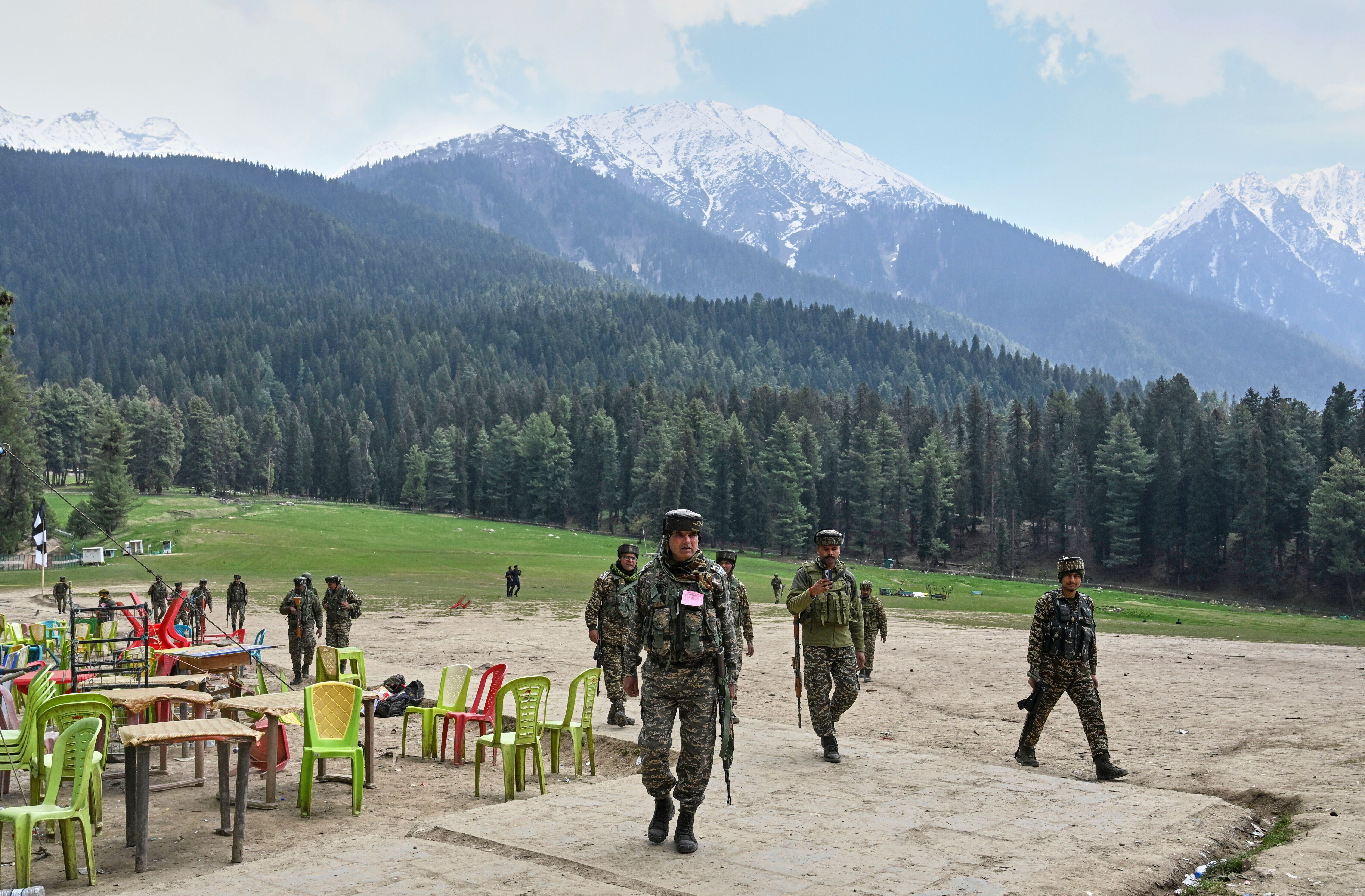ARTICLE AD BOX
In the aftermath of the deadly attack on tourists in Kashmir that killed at least 26 people, India on Wednesday expelled Pakistani diplomats and suspended the landmark 1960s Indus Water Treaty until the neighbouring nation “credibly and irrevocably” ended “support for cross-border terrorism”.
In a sweeping diplomatic offensive against Pakistan after the attack at the popular tourist destination of Pahalgam, New Delhi summoned Islamabad’s top diplomat, Saad Ahmad Warraich, and handed him a Persona Non Grata notice, foreign secretary Vikram Misri said.
It also ordered all defence advisors at Pakistan’s embassy to leave within a week and moved to withdraw its own military staff from Islamabad.
“These posts in the respective high commissions are deemed annulled,” Mr Misri added. “Five support staff of the service advisors will also be withdrawn from both high commissions.”
Both missions will scale down their staff strength from 55 to 30 by 1 May 2025.
The move came after a Cabinet Committee on Security meeting chaired by prime minister Narendra Modi formulated a slew of punitive measures against the neighbouring country.
New Delhi has long accused Pakistan of enabling the armed separatist movement in Kashmir, a restive Himalayan region claimed in whole but held in part by the rival countries.
Pakistan has denied any role in the Pahalgam attack. Its top security body is meeting on Thursday to assess India’s “sharp response” and “formulate a comprehensive policy reaction to the slew of aggressive measures announced by New Delhi”, Dawn reported.
It is the suspension of the Indus Water Treaty, however, that analysts say will have the most profound consequences of all the measures announced by India. The treaty gives India unrestricted right to use the waters of the eastern rivers – Sutlej, Beas and Ravi – and entitles Pakistan to the western rivers of Indus, Jhelum and Chenab.

The Integrated Check Post at Attari has been closed. The border crossing, one of the last active conduits between the two countries, has played a key role in facilitating limited trade, religious pilgrimages and diplomatic interaction over the years.
In a further blow to bilateral relations, all Pakistani citizens have been prohibited from entering India under the SAARC Visa Exemption Scheme. Previously issued SVES visas have been cancelled and those already in India must leave within 48 hours, the foreign secretary said.
Addressing the media, Mr Misri said the Cabinet Committee on Security had assessed the overall security environment and instructed all forces to remain on high alert.
Indian defence minister Rajnath Singh promised a “strong response” to the attack as the risk grew of military escalation in the subcontinent.
“Those responsible and behind such an act will very soon hear our response, loud and clear,” he said. “We won’t just reach those people who carried out the attack. We will also reach out to those who planned this from behind the scenes on our land.”
The government would take “every step that may be necessary and appropriate”, Mr Singh added.
Military analysts do not discount the possibility of action similar to the cross-border strikes on Pakistan in 2016 and 2019.
After a militant attack in Kashmir’s Uri in September 2016 killed 19 Indian soldiers, the military conducted what it termed “surgical strikes” across the Line of Control, the de facto border with Pakistan, targeting suspected militant launch pads. In 2019, the Indian air force launched airstrikes on a suspected militant camp in Balakot, the first deep strike in Pakistan since the 1971 war, after over 40 paramilitary troops were killed by a suicide bomber in Kashmir’s Pulwama. Pakistan retaliated with air raids of its own.
“We are likely to see a strong response – one that signals resolve to both domestic audiences and actors in Pakistan. Since 2016, and especially after 2019, the threshold for retaliation has been set at cross-border or air strikes,” military historian Srinath Raghavan told the BBC. “It will be hard for the government to act below that now. Pakistan will likely respond as it did before. The risk, as always, is miscalculation – on both sides.”
Pakistan’s foreign minister Ishaq Dar called India’s slew of punitive measures “immature” and “hasty”. “India has not given any evidence. They have not shown any maturity in their response,” Mr Dar told a TV channel. “This is a non-serious approach. They started creating hype immediately after the incident.”
Pakistani analysts caution that any confrontation could escalate beyond the 2019 standoff. “Indian escalation already began last night and it will be at a bigger scale than February 2019,” security analyst Syed Muhammad Ali told The New York Times.
He argued that India was exploiting the attack to gain support from the US, ease tensions over US president Donald Trump’s tariff threat, and recast the push for Kashmir’s independence as a terrorist movement.
Former Pakistani diplomat Asif Durrani described the Kashmir attack as “unfortunate and condemnable”, while adding: “but the Indian reaction against Pakistan is a sheer provocation leading to a suicidal course.”
Husain Haqqani, Pakistan’s former ambassador to the US and senior fellow at the Hudson Institute, cautioned that “jingoism is not strategy”.
“Playing screaming warrior on TV is easy but war is always difficult. India & Pakistan have both seen this tragic movie before. Time to try and change the ending,” he said on X.
Indian TV channels have framed the wider situation in the wake of the Pahalgam attack as a Hindu versus Muslim issue, fuelling polarisation and hatred towards the minority community, and especially Kashmiri Muslims.
Several right-wing Hindu groups have started issuing threats and hostile rhetoric towards Kashmiri Muslims and there have been reports of violence as well. In a viral video shared on social media, Kashmiri students in Dera Bassi in the northern city of Chandigarh recounted a brutal midnight attack with sharp weapons inside their hostel, alleging that the campus security didn’t intervene and the Punjab police failed to respond.



.jpeg?trim=0,0,0,0&width=1200&height=800&crop=1200:800)





 English (US) ·
English (US) ·